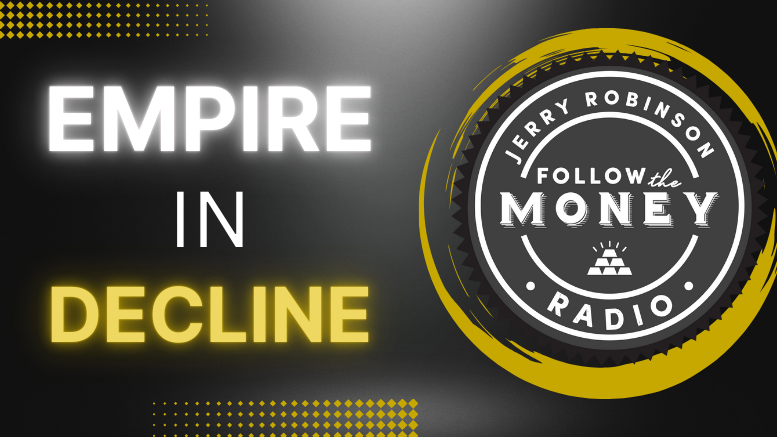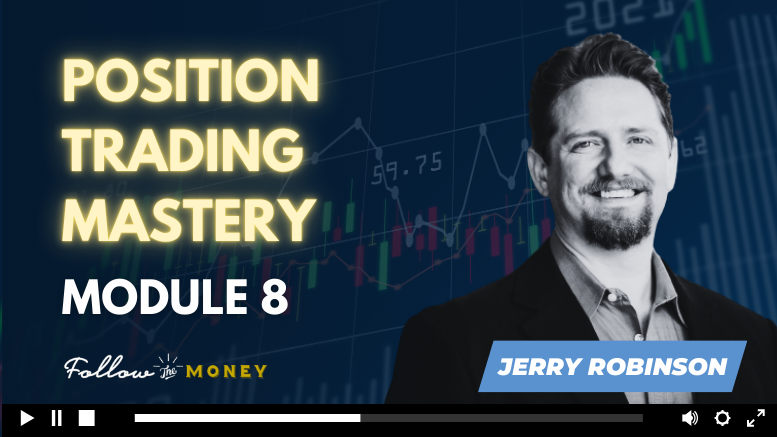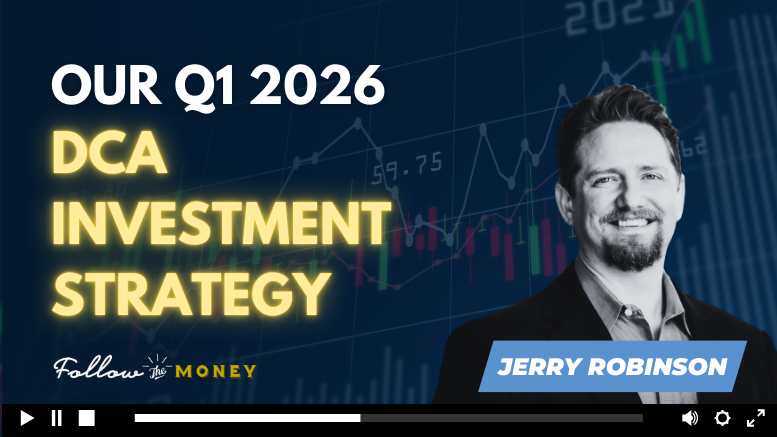by Jennifer Robinson | FTMDaily Staff Writer
HOUSTON, May 31
Today, FTMDaily.com sits down with Jerry Robinson to ask him questions that every reader wants to know. From creating multiple streams of income, to the commodities markets, to Jerry’s outlook on the exciting future of FTMDaily.com, we have the scoop from the founder and editor-in-chief himself. Enjoy the interview!
An Interview with Jerry Robinson
FTM: Many of our readers have expressed excitement about upcoming products and services at FTMdaily.com. Jerry, what is the vision behind all of your products and services, and what is your goal for the future of FTMDaily?
JR: You know, when I started FTMDaily.com a couple of years ago, I never dreamed that it would grow so quickly. I have always had a passion for finance, economics, and investing, and I have always viewed those topics through the lens of my own Christian faith. So when I started FTMDaily, I didn’t honestly know what kind of response to expect from our readers. And I must admit that I never dreamed we would grow so large so fast.
Our readership spans the entire country, that is, we have readers in all 50 states. We even have many readers overseas. The growth of our radio show has been phenomenal as well. Each week we have tens of thousands of listeners. If you would have asked me two years ago if I would have believed this would be possible, I would have laughed. Furthermore, our newsletter, FTM Quarerly, has become our most popular flagship product with readers all over the country.
I think right now in 2011, people are really just searching for answers when it comes to their finances. There has been so much bad financial advice given over the airways and in the mainstream media in general that I believe people are starved for real answers to their financial dilemmas.
My goal with FTMDaily.com has been and remains to provide real solutions for real people dealing with real problems. That’s why I am proud to announce our latest book that is scheduled to be released later this summer on the topic of multiple streams of income.
Over the next several years, my goal for FTMDaily.com is to make it a destination site for those who want creative solutions for their finances.
FTM: You released an important free report last week, in which you recommended developing multiple streams of income. How did you develop this concept and why is it one of the vital components of financial freedom?
JR: Back in 1995 I started my first business while still working full time at a company. Since those early days I have learned a lot about running a business. I have made a lot of money and lost a lot of money since then. However, it all boils down to being able to take risks. But the biggest risk is not trying at all. Having one stream of income has never been an option for me; it is the scariest thing I could ever imagine. I honestly don’t know how people can do it, especially when you consider how many options exist for people who want to create multiple streams of income.
You know, the reason I am creating this product on multiple streams of income now is because of the many people who have contacted our office with stories of being unemployed. I truly believe that if people can change their thinking they will never have to worry about unemployment again.
As I have traveled around the country, I have consistently heard from people that this topic of multiple streams of income is one that they desperately want to know more about. So in this upcoming book, I plan to reveal all that I know about creating multiple streams of income. As of right now, this book is going to contain 16 income streams that a person can create for retirement. I have been working on it feverishly, and I am very excited about putting it into people’s hands. I know it will help many people.
FTM: Many financial gurus today (Dave Ramsey, Crown Financial, etc) are constantly stressing the importance of being debt-free. You rarely breach the topic of debt on your show. What exactly is your philosophy on debt?
JR: Well, this is a sensitive topic for some people, so let me begin by saying that I have the utmost respect for Dave Ramsey, Crown Financial, and others who teach the importance of being debt-free. I agree that not being in debt is a wonderful thing. My philosophy is that being in debt is not the problem most people face. The problem for most people is their thinking.
I can show a man how to get debt-free very easily; in fact, I have created a debt stacking method that can eliminate most debt in 5-7 years (including a mortgage). However, being debt-free is only one piece of the puzzle. I believe that the slavery that most people are in is not because they have debt, but because they don’t understand money itself.
Most people are taught from a young age to go to school, get good grades, go to college, and then get a good job. Today, the result of this advice leaves 95% of Americans dead broke at age 65. I know many people who are debt-free, but they are also dead broke.
So debt freedom is not the equivalent of financial freedom. What we teach is the importance of understanding how to actually construct and develop a financial plan. This includes laying a good foundation, solid asset protection, savings diversification, and investment and income diversification.
These concepts will lead a person out of financial slavery. So it’s not just about paying off your mortgage, it is about understanding the rules of the game, and overcoming the Consumption Trap and thinking like a producer.
Having said all that, if someone’s goal is strictly to pay off debt, I highly recommend Dave Ramsey or similar organizations. However, if the goal is true financial freedom, I believe that the solution lies in our Five Levels to Financial Freedom.
FTM: We have many readers who are wondering what is in store for the markets this summer and into the fall. What do you see on the horizon in the next 3-5 months?
JR: These markets are tricky right now. Of course, I oversee the FTM Investment Portfolio, which has had cumulative returns of 25% since its inception. So obviously, I am watching the markets like a hawk. However, we are in an interesting time period in which politicians and the political process are playing a larger than normal role in the economy.
In the past, politicians have had a limited impact upon the markets. However, today in our precarious economic situation, the economy is virtually at the hands of Washington’s policy makers. This means that smart investors not only have to keep an eye on what is happening in the US and global economies, but also what might be coming down the pike from Washington over the next 12-18 months.
The US has already busted through its debt ceiling, and in order to fund the Federal Government’s spending, Washington has become overwhelmingly dependent upon the Federal Reserve. Make no mistake; the US economy is in a long-term downward spiral. There is no debate about this. There is no reason to question this. It is the fate of the nation. Just as it has been the fate of every other empire before it. We have consumed too much and we are now producing too little.
I will not belabor the problem, but will say that our competitors are rising rapidly. This means that over the next several years, the US economy will become less important to the global economy. But that is not true today.
Today the US dollar still reigns supreme, and the US treasury market is considered the safe haven of the world. Therefore, barring an event that causes a major change in investor perception, we will continue to see global funds flow to the US dollar and to the US bond market in times of crisis.
However, at the same time, there are major supply constraints on global resources, such as commodities. This causes an interesting tension as investors seek safety and return at the same time.
As we near the end of June, and as QE2 officially comes to an end, basic economics tells us that the US dollar will increase in value. This is because the end of QE2 could be the beginning of interest rate hikes in the United States. However, based upon my own research, the Fed will not begin hiking interest rates any time soon.
Investors do well to remember that 2012 is a presidential election year. History tells us that in election years, easy money policies are usually the rule. So, I would not expect any major rate increase campaigns to begin until the spring or summer of 2013. However, until the markets figure this out, the dollar will continue to rise in anticipation of higher rates.
When the market realizes that rates are going to stay low, this will again lead to a major drain on the US dollar, and we will see the second leg up in the commodities bull market. Those who have been following my thoughts on this for some time know my favorite investments: PACE.
The PACE philosophy that I subscribe to includes Precious Metals (like gold, silver, and palladium), agricultural commodities (like corn, wheat, rice, and other food stuffs), and energy (including petroleum and alternative energy sources). It is my belief that these areas will continue to be the prime beneficiaries in the midst of US economic decline.
FTM: The financial “experts” are calling for gas prices to soar this summer. One of the areas you suggest for investments is energy. With the “expert” predictions in mind, what do you think is the best way to invest in this area?
JR: You know, I really don’t understand why so many people don’t get that energy is a wise investment. There was another recent report issued by a university in Kuwait which stated that global peak oil would be reached by 2015. This report is well-respected by energy analysts. Within a decade, everyone will understand the virtues of owning the oil giants. In the meantime, many people are apparently living in denial that oil supplies will remain high and will always exceed global demand.
The three areas that I like in particular in the energy sector are crude oil, natural gas, and nuclear. Crude oil will obviously offer the quickest and most stable returns. Natural gas, on the other hand, may take a few years to provide the type of returns that many would consider acceptable. Right now, natural gas is dirt cheap; in fact, many oil companies are losing money through its production.
However, the demand for US natural gas at current prices has been peaking interest in emerging nations. The problem with natural gas is that it must be liquefied in order to be transported. This can be costly, and for the US, proves to be particularly difficult. However, plans are afoot to retrofit many of the existing LNG terminals to allow exports.
If global demand for natural gas could take advantage of America’s abundant supply, this will drive prices up. And it is just a matter of time before this occurs. The best way to play natural gas is through well-established, well-managed, US based companies. I will be adding one or two of these to our FTM Investment Portfolio soon.
Regarding nuclear energy, we are at a unique time. Nuclear energy represents a tremendous alternative to other types of energy sources. Of course it poses political problems, and after Japan’s crisis, prices of good nuclear energy companies have been rocked.
This, of course, represents an opportunity to contrarians. I recently added one very well run and well-managed nuclear energy company to the FTM Investment Portfolio. I believe this company will outperform over the next several years as the world moves on from the Japan nuclear energy crisis.
___________________________________________
We trust you enjoyed this in-depth Q&A session with Jerry Robinson. If you have any questions or comments on any of the topics or products mentioned, please submit them using the comment box at the end of this article.
___________________________________________
Here at FTMDaily.com, we are working hard to create solutions for you during these difficult times of economic crisis. We invite your feedback and comments on how we may serve you better. Feel free to contact us directly at info@ftmdaily.com.






